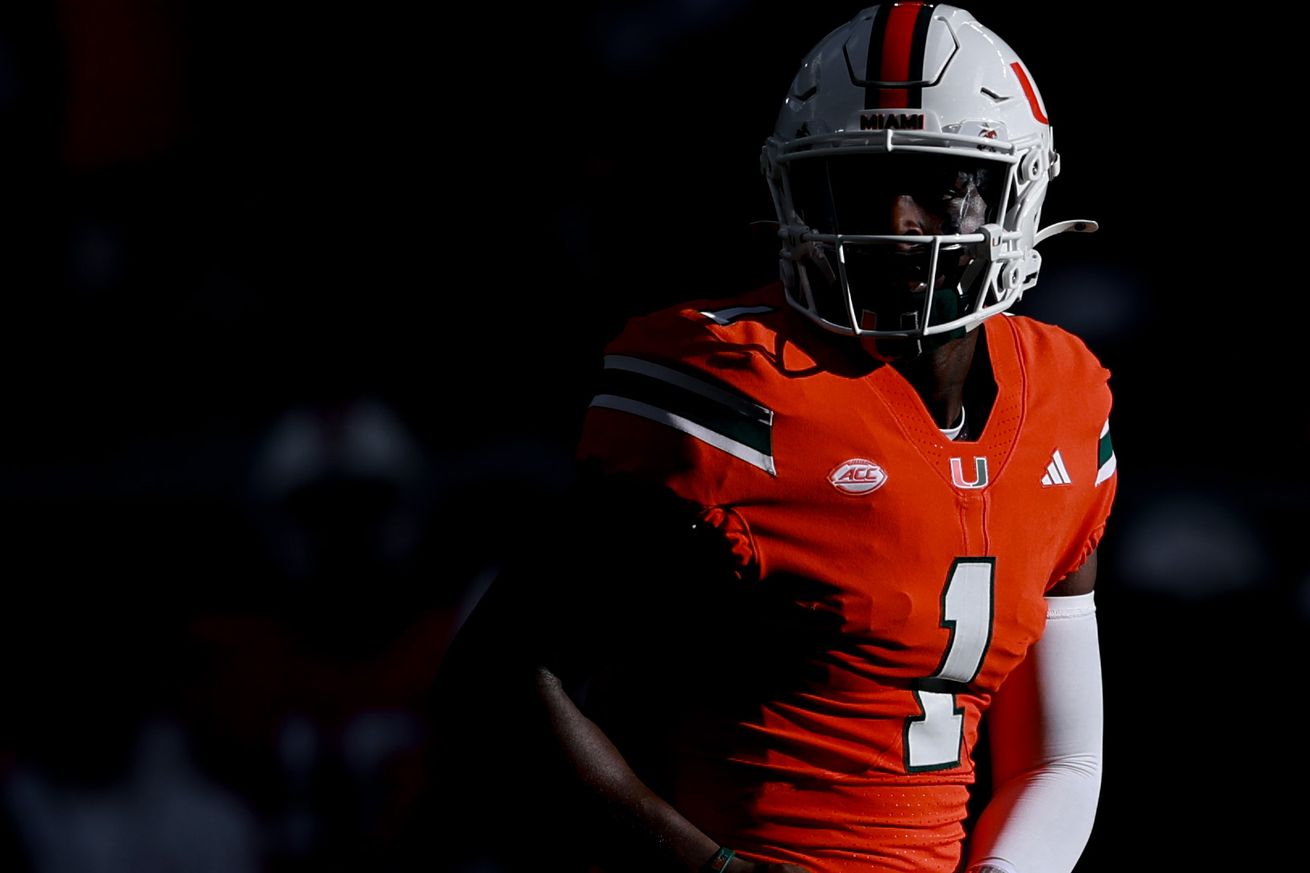
Cam Ward has made his case as the best quarterback to ever play at Miami – but is he? The conversation needs to be had.
The GOAT debate in sports is always a complex one to have. No matter the topic, a multitude of variables must be considered when conversations are conjured up regarding the best players, teams, or coaches of all time. Statistics, rules, God given talent, health, and even eras of competition should all be factored in.
At the University of Miami, some players hold career records without being universally considered the best at their respective positions. Duke Johnson is Miami’s all-time leading rusher, however, Edgerrin James is often recognized as the best running back in school history.
Xavier Restrepo owns virtually every receiving record in the book at Miami, yet Michael Irvin and Andre Johnson are mentioned before him as WR1.
At safety, Hurricanes legends like Bennie Blades, Ed Reed, and Sean Taylor each can stake their claims as the best safety to dawn the orange and green, but only one can be labeled as the best.
Miami’s quarterback tradition boasts a lineage of legends, from Jim Kelly (1979-1982) to Ken Dorsey (1999-2002), each a testament to the program’s greatness. These signal-callers, adorned with Maxwell Awards, Davey O’Brien Awards, Heisman Trophies, All-American honors, national championships, or any combination of the five, played pivotal roles in shaping the program’s illustrious history.
But what must the best quarterback in Canes football history accomplish to earn the title of GOAT? Is it as simple as winning it all and dominating statistical categories? Is it achieved by carrying a team and claiming signature victories over bitter rivals while showcasing supreme individual talent and collecting individual awards in the process?
Must it look a certain way?
Whatever the case, it was Jim Kelly, whose performances are credited for putting Miami on the map by winning nationally televised games against college football’s best, that helped Miami earn the nickname “Quarterback U” during their decade of dominance.
The Pittsburgh, Pennsylvania native pledged to the University of Miami in 1979. Four seasons, 5,228 pass yards, 33 touchdown passes, and 30 wins later including a Peach Bowl victory over Virginia Tech with MOP honors, not to be overshadowed by a program-altering win versus the #1 ranked Penn State Nittany Lions in the Orange Bowl on Halloween in 1981, Kelly stated his case as not only one of the best quarterbacks to play for Miami but one of the most impactful players to ever suit up in the orange and green up to that point.
His performances laid the foundation for what was forthcoming in the coming years.
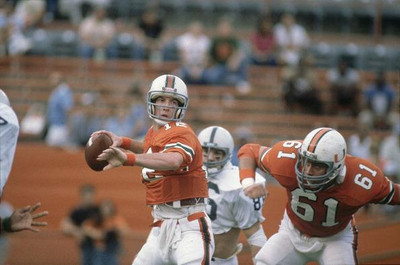
Ghosts of the Orange Bowl
As much as a program changer Kelly was for Miami, he merely paved the way for his successor. After redshirting the 1982 season, Bernie Kosar took the reins and started all 12 games in 1983. Like Kelly, known for putting the nation on notice regarding Miami being a serious football program, Kosar deserves credit for leading the Canes to their first national championship in the most unexpected of fashions.
In what has to be considered one of the best single seasons in school history, Kosar claimed wins over 13th-ranked Notre Dame, 12th-ranked West Virginia, and the rival Seminoles in a regular-season finale thriller at Doak Campbell Stadium.
His accuracy and leadership qualities as a young signal-caller were apparent despite the lack of an eye-popping statistical redshirt freshman season. Thirteen interceptions thrown proved that, however, he culminated year one by completing 61.5% of passes and defeating Tom Osborne’s top-ranked Nebraska Cornhuskers in the Orange Bowl to claim the 1983 national championship.
Kosar’s career was highlighted by winning 13 consecutive games. In that span, five victories came against ranked opponents, two of which were back-to-back wins versus the #1 team in the nation – 1983 Orange Bowl national championship game and 1984 Kickoff Classic versus Auburn in East Rutherford, New Jersey. In Kosar’s second season, he set single-season records for passes completed (262), passing yards (3,642), total offense (3,412 yards), and touchdown passes thrown.
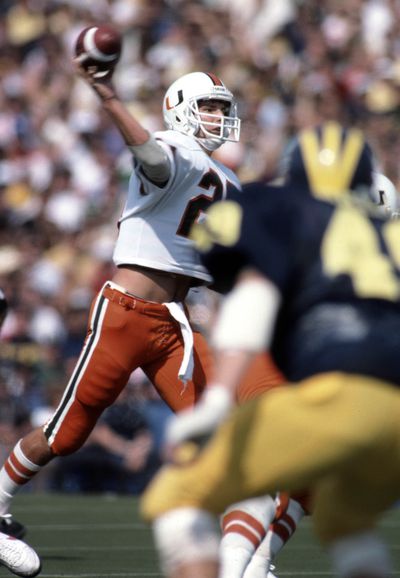
Malcolm Emmons-Imagn Images
The next player to uphold the Quarterback tradition in Coral Gables was none other than Vinny Testaverde. After arriving at Miami in the fall of 1982, Testaverde waited his turn before seeing the field as a full-time starter. Hailing from Brooklyn, New York, Testaverde saw limited playing time in his true freshman season despite being part of a talented quarterback room that included Jim Kelly, Bernie Kosar, and Mark Richt.
He took a redshirt year during Miami’s 1983 title run and served as a backup again in 1984 before taking the reigns and starting as a junior in 1985. Testaverde enjoyed a 3,238 passing yard season as a first-year starter, including tossing 21 touchdowns, culminating in a 10-2 record and a No. 9 final ranking. Those numbers eclipsed Kosar’s when he led Miami to its first of five national championship victories.
A successful junior season set the stage for Testaverde’s fifth and final, one that etched his name in the Miami record books. 1986 season saw him total 30 touchdowns (26 passing, 4 rushing), complete 63.4% of his passes, earn unanimous First-Team All-American honors, win the Walter Camp Player of the Year, Maxwell, Davey O’Brien and UPI Player of the Year awards.
Most notably, he was the recipient of the 1986 Heisman Trophy, the first in program history. Testaverde ended his Miami career as the all-time leader in touchdown passes (48), passing yards (6,058), and both season and career completion percentage, while leading the Canes to a 21-1 regular season mark as a starter. He was selected as the number one overall pick in the 1987 NFL Draft by the Tampa Bay Buccaneers.
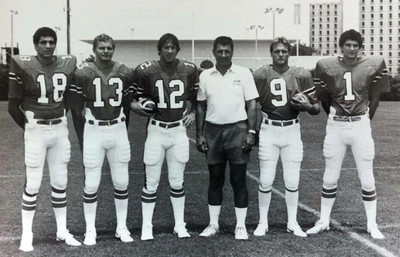
With the most decorated quarterback in program history off to the pros, sophomore Steve Walsh stepped into a high-pressured situation and was expected to lead a squad with superior talent. Senior running back Melvin Bratton, junior wideout Michael Irvin, Brian and Bennie Blades, Cortez Kennedy, Russell Maryland, George Mira Jr. and a host of other University of Miami football household names were all part of a heartbreaking national championship loss the season prior and Walsh was tasked with making a mends for that daunting defeat.
Walsh followed a redshirt season by backing up Testaverde in 1986, only to race through an undefeated regular season that included a demonstrative 31-4 win over the twentieth-ranked Gators and a nail-biting 25-26 victory over the fourth-ranked Seminoles at Doak Campbell Stadium. He went three for three versus Hurricanes rivals after dispatching the Fighting Irish 24-0 in front of an Orange Bowl crowd of 76,640 the Saturday after Thanksgiving.
The steady play of the redshirt sophomore resulted in a modest 2,249 passing yards, less than Kosar’s and Testaverde’s first season. He also threw 19 touchdowns and was intercepted only seven times, throwing an interception in only 2.3% of passes. Walsh guided Miami to its second undefeated season in program history – the first since the 1926 inaugural season, and the first undefeated championship season in school history beating the top-ranked Oklahoma Sooners 20-14 in a game in which he hit on 18 of 30 passes for 209 yards and two touchdowns.
Expectations were soaring for the Hurricanes as Walsh entered his redshirt junior season. The field general from St. Paul, Minnesota, bested his sophomore numbers by passing for a career-high 3,115 yards and a single-season school record 29 touchdown passes.
Aside from Walsh closing his Hurricanes career tied with Vinny Testaverde for the most touchdown passes thrown in school history (48) and a 23-1 overall record as a starter, he also finished fourth in 1988 Heisman Trophy voting, was the runner-up to Troy Aikman for the Davey O’Brien Award, was named first-team All-American quarterback by the Associated Press, the Football Writers Association of America and ESPN, and was The Football News College Player of the Year.
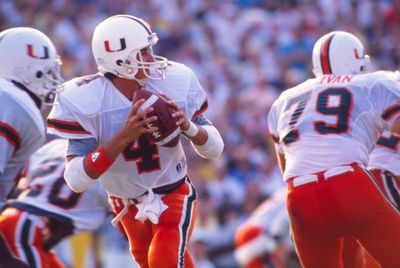
Photo by James Drake/Getty Images
Twice in his four seasons was Craig Erickson fortunate enough to call himself a national champion. However, the 1989 championship season cemented Miami’s legacy as the “team of the decade” giving the program its third title in six years. The first-time starter was accompanied by first-year Miami head coach Dennis Erickson who leaned on the Hurricanes’ defense to rattle off six straight wins to open the season.
Craig Erickson did not play in Miami’s lone loss at FSU as he was sidelined for three games in the middle of the season due to injury. And although the third-year junior did not dominate the box score as his predecessors did with only 16 passing touchdowns and 2,007 passing yards on the season, he made up for it with a banner year the following season.
His 3,363 passing yards in 1990 which included six 300-yard passing games, is the fourth-highest single-season total in school history behind only Cam Ward, Bernie Kosar, and Ken Dorsey. Some of Erickson’s most memorable performances came during bowl games in which Miami won. He accounted for three touchdown passes in a 33-25 victory over the Alabama Crimson Tide in the USF&G Sugar Bowl, and four touchdown passes against the Texas Longhorns at the Cotton Bowl Classic the following season.
Erickson accompanied his three thousand-yard season by throwing 22 touchdowns and winning the Johnny Unitas Golden Arm Award recognizing the nation’s top quarterback who best exemplifies character, scholastic and athletic achievement. He also placed second in the balloting for the Davey O’Brien Award, won by BYU’s Ty Detmer. Erickson finished his career with a 16-2 record as a starter while his 46 career passing touchdowns place him ninth in school history.
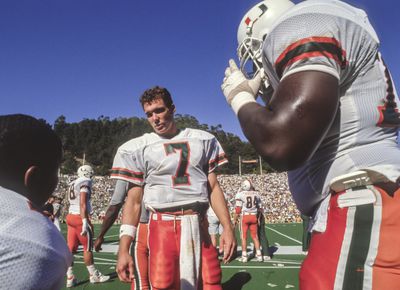
Photo by David Madison/Getty Images
Gino Torretta arrived in Coral Gables for the ‘89 season alongside head coach Dennis Erickson, and sat at the helm of a high-powered offense in 1991, his first season as a starter. In a system built on speed, Torretta and the skill players surrounding him nicknamed “The Ruthless Posse,” posted scoring outputs of 30-plus points in seven of eleven regular season games. An undefeated regular season earned the Canes a trip to the national championship game where Miami shutout the Nebraska Cornhuskers 22-0 in front of a New Year’s Day Orange Bowl crowd.
There was no drop in production for the defending national champions in 1992. Miami’s explosive attack eclipsed the 30-point mark on six occasions with four games surpassing the 40-point threshold including a 63-point outburst versus San Diego State. Torretta stands as a unique figure in Miami Hurricanes history, becoming the first, and only one of three quarterbacks to achieve consecutive 3,000-yard passing seasons. He accomplished this feat in 1991 (3,095 yards) and 1992 (3,060 yards).
Torretta’s impressive numbers consisting of 19 touchdown passes, paced the Hurricanes offense en route to 356 points scored on the season – a 32.4 per game average ranking them ninth in the country, and another undefeated regular season. The senior gunslinger was awarded the Heisman over Marshall Faulk in the midst of ‘Canes sitting on 29-straight wins — 23 of them with Torretta as the starter.
The Johnny Unitas Golden Arm Award, the Maxwell Trophy and the Davey O’Brien national quarterback awards were added to his list of accolades.
He finished his Miami career with eleven school passing records, including career attempts (991), completions (555), yards (7,690), total offense (7,722), longest pass (99 yards to Horace Copeland vs. Arkansas, an NCAA record) and most passing yards in a game (485 vs. San Diego State).
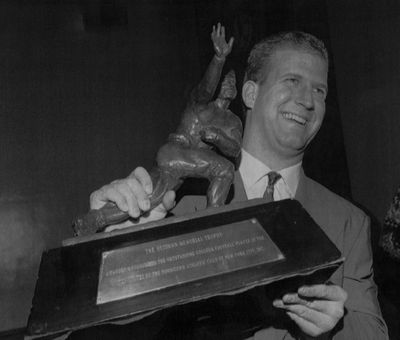
Ken Dorsey is one of the most respected Hurricanes in program history. That respect stems from the manner in which he led a roster brimming with future Hall-of-Fame players as he was not just a vocal leader; he led by example, inspiring his teammates through his actions on and off the field. Dorsey’s first start came as a true freshman in 1999 – he went on to win his first four starts before dropping his first road start at Washington during his sophomore season.
Following the loss, the former USA Today high school Honorable Mention All-American from Orinda, California went on to capture 34 consecutive wins, posting a 38-2 record as a starting quarterback. Included in Dorsey’s 38 wins lies a BCS national championship, two bowl victories as a starter, and an impressive 4-0 record against Florida State and Florida (3-0 versus FSU) during his 34-game win streak.
The moment his name was etched in Miami lore came after the sophomore’s thrilling 27-24 comeback victory over the defending champion, top-ranked Seminoles, before a raucous crowd of nearly eighty-one thousand on a scorching hot October afternoon at the Orange Bowl.
As the orchestrator of an offense that was instrumental in being part of the greatest college football team of all time in 2001, Dorsey conducted an attack that averaged 454.8 yards per game, beating opponents by the largest margin in UM history, 33.2 points per game. He proved to be the ideal quarterback for Miami’s balanced attack and led the charge to a perfect regular season. His troops followed his lead to the tune of a 37-14 drubbing over the Nebraska Cornhuskers in Pasadena to claim the program’s fifth national title in the 2002 Rose Bowl.
Dorsey was named Co-MVP of the game throwing for 362 yards and three touchdowns, outdueling Nebraska’s Heisman-winning quarterback, Eric Crouch. Heisman voters placed Dorsey third in their balloting but he did take home the 2001 Maxwell Award, presented to the outstanding collegiate player of the year.
Miami’s all-time winningest quarterback had his best statistical season as a senior when Dorsey passed for 3,369 yards and 28 touchdowns. Despite an impressive regular season, he finished fifth in Heisman voting with 122 first-place votes. Dorsey holds Hurricanes career records for most passing yards (9,565), touchdown passes (86), highest win percentage (.974), total offense (9,486 yds), and ranks third behind Jacory Harris and Brad Kaaya with 668 career completions.
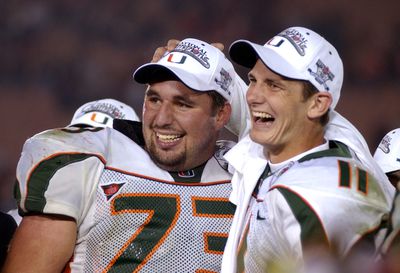
Photo by Jon Soohoo/WireImage
Thirty-five years after Miami snatched Dennis Erickson from the clutches of Washington State University, history repeated itself when Cam Ward transferred to Miami from Pullman, Washington. With the intention of improving his NFL draft stock, Ward blew away the competition by setting school records that took prior Hurricanes quarterbacks entire seasons or careers to reach.
His lone season as a Hurricane was unlike any other from a quarterback at Miami and he began the 2024 season with a bang, torching a Gators defense for 385 yards — the most in a debut in program history. He continued to rack up 300-yard performances just like he racked up Heisman moments.
Ward, a Heisman Trophy finalist, surpassed the 300-yard mark in the season’s first seven games and 10 times over his 13 games played at Miami. The single-season touchdown mark set by Steve Walsh in 1988 was broken by Ward in only nine games when he tossed his fifth touchdown pass versus Duke. His five touchdowns in the game is tied with six former Hurricanes quarterbacks for the most touchdown passes in a contest.
He possesses single-season Miami records for most passing yards (4,313), most 300-yard games (10), most touchdown passes (39), and is tied with Stephen Morris for the most games of 400+ passing yards in a season (3).
In Ward’s final game as a Cane, he needed one touchdown pass in order to break the Division I — FBS and FCS — record held by Houston’s Case Keenum. He delivered three touchdowns passes bringing his career total to 158.
Aside from owning own numerous Miami records, he is also responsible for several late-game heroics that will be part of his Hurricanes legacy, such as the riveting 25-point comeback against the California Golden Bears, and jaw-dropping moments like the touchdown pass to Jacolby George he threw against the Gators. Ward’s uncanny ability to escape pressure, evade sacks, and make throws from awkward angles with pinpoint accuracy is what sets him apart from any other quarterback in the history of the program.
Prior to his final collegiate contest, Ward became the third Hurricane to win the Davey O’Brien Award. He was also recognized as the ACC Player of the Year, ACC Offensive Player of the Year, and a First-team All-American (AP, AFCA, Sporting News, Walter Camp).
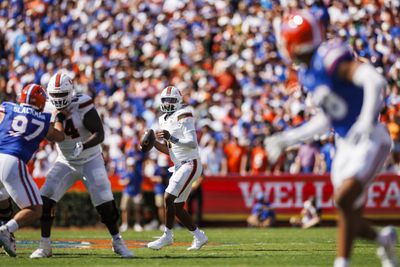
Photo by James Gilbert/Getty Images
Given the illustrious history of Miami Hurricanes quarterbacks, with their countless accolades, standout seasons, unforgettable moments, and championship careers, crowning one as the “best ever” presents a formidable challenge.
Which one of these legendary players checks off all the necessary boxes to be declared the best signal caller in program history?
Is it Cam Ward and all he did in 13 games despite not winning a bowl game although he can easily contend as the most physically gifted passer in school history?
Could it be Dorsey who won a national championship as the unquestioned leader on the offense of the greatest college football team ever assembled?
Then again, how could it be Dorsey if he never won a Heisman when Gino Torretta won a national championship, the 1992 Heisman Trophy, and led the 1991 team to an undefeated season?
What about Jim Kelly, the trendsetter himself who started it all back in 1979 by laying the foundation for so many great quarterbacks to succeed at Miami?
How much does the “eye test” factor into a discussion like this?
These are all questions that must be taken into account when broaching this topic.
Arguments can be made for each quarterback previously mentioned, especially when one evaluates their individual performances in “must-win” games. Given the numerous factors to consider when narrowing this list, establishing criteria that accurately reflects each player’s accomplishments can be quite challenging.
So, after all that, who do you think is the best quarterback to ever suit up for the Hurricanes?
